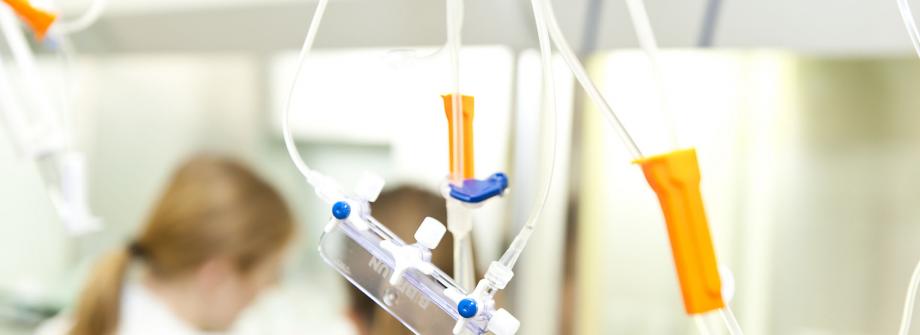
December 2023 Clinical Case of the Month
Title: Cytopenia after CAR-T cell infusion for DLBCL – excluding clonal myeloid evolution.
Submitted by:
Giorgio Orofino, MD
Hematology-Oncology Fellow
Università Vita e Salute San Raffaele
Milan, Italy
Physicians expert perspective:
Annalisa Ruggeri, MD, PhD
Hematology and BMT Unit
IRCCS San Raffaele Hospital
Milan, Italy
A 70-year-old male, diagnosed with Diffused Large B Cell Lymphoma (DLBCL) with bone marrow involvement, refractory to three chemotherapies lines of treatment, was treated with CAR-T Cell (Axicabtagene Ciloleucel), in San Raffaele Hospital in Milan, Italy. The patient developed Cytokine Release Syndrome (CRS) G1 treated with two doses of Tocilizumab and Immune effector cell-associated neurotoxicity syndrome (ICANS) G2 treated with steroids.
Ten months after CAR-T cell infusion, the patients was in complete disease control with Positron emission tomography (PET) negativity and no bone marrow infiltration; B-Cell aplasia was maintained.
The patient experienced hematotoxicity after CAR-T cell infusion, developing persistent cytopenia (Anemia G1-Neutropenia G2-Thrombocitpoenia G2). A bone marrow evaluation was performed 8 months after CAR-T cell infusion; bone marrow blasts were less than 5%, no lymphoma infiltration was observed; cytogenetic analysis revealed a deletion of Y chromosome detected on 15 metaphases, not previously associated with primary disease. Due to this finding, NGS analysis was performed and an oncogenic variant of the DNMT3A gene, with a Variant Allele Fraction (VAF) < 3%, was identified.
Which of the following statements is correct?
A. CRS and ICANS are the only causes for this condition
B. A diagnosis of Myelodysplastic syndrome (MDS) may be proposed
C. Clonal Cytopenia of Unknown Significance (CCUS) may explain this case
D. These findings are normal after a CAR T cell therapy
Expert perspective by Annalisa Ruggeri:
Patients treated with CAR-T cells are increasing world-wide and short- and long-term toxicities are emerging, warranting early recognition and appropriate management. Among them cytopenia is frequent and may cause relevant consequences in treatment’s outcomes, such as prolonged hospitalization, need of anti-microbial therapies, and in general treatment related morbidity and mortality1-2.
Cytopenia may be manifest in the early post CAR-T cell infusion phase (<30 days), generally associated with lymphodepleting chemotherapy, infections, CRS, ICANS or immune-effector cell-associated hemophagocytic syndrome (IEC-HS), prolonged (30-90 days) or occur late (>90 days).
Bone marrow biopsy, especially in patients with prolonged or late cytopenia is crucial to investigate the potential cause, exclude primary or secondary diseases to potentially explore treatment options.
Clonal cytopenia of unknown significance is characterized by low blood count, with a proportion of cells acquiring a genetic mutation, in which diagnostic criteria for classification according to WHO 2022 into the MDS subgroups "MDS with defining genetic alterations" or "MDS, morphologically defined" are not met. This condition is associated with higher risk of developing clonal hematological diseases such as myelodysplastic syndromes (MDS) or Acute Myeloid Leukemia (AML), but also cytopenia itself may lead to negative outcomes3. CCUS should be distinguished from clonal hematopoiesis of indeterminate potential (CHIP), in which acquired molecular genetic alterations are detectable but cytopenia is not present. Possible environmental factors, such as aging, smoking, inflammatory states, previous malignancy, and chemotherapy treatments are postulated to contribute to both occurrence and progression of unexplained cytopenia, and the patient presented was heavily pre-treated with chemotherapy and had a diagnosis of lymphoma. In summary, since the diagnostic criteria for CCUS were met, the correct answer is C. Some recent works reports on several cases of CCUS/MDS occurring after CAR-T cell therapy4-5. Furthermore, other possible clonal evolution potentially driven by genetic mutations should be carefully evaluated in patients receiving CAR T cell immunotherapies6.
The management of this patient should include monitoring with complete blood cell counts and a peripheral smear once every 3 to 6 months with bone marrow analysis at any time of a significant change in cytopenia. Treatment options may also include autologous stem cell boost if available, growth factors, corticosteroids, intravenous immunoglobulin and symptomatic treatment for anemia.
Correct answer: C
References:
- Jain T, Olson TS, Locke FL. How I treat cytopenias after CAR T-cell therapy. Blood. 2023 May 18;141(20):2460-2469. doi: 10.1182/blood.2022017415. PMID: 36800563; PMCID: PMC10646792.
- Rejeski K, Subklewe M, Aljurf M, Bachy E, Balduzzi A, Barba P, Bruno B, Benjamin R, Carrabba MG, Chabannon C, Ciceri F, Corradini P, Delgado J, Di Blasi R, Greco R, Houot R, Iacoboni G, Jäger U, Kersten MJ, Mielke S, Nagler A, Onida F, Peric Z, Roddie C, Ruggeri A, Sánchez-Guijo F, Sánchez-Ortega I, Schneidawind D, Schubert ML, Snowden JA, Thieblemont C, Topp M, Zinzani PL, Gribben JG, Bonini C, Sureda A, Yakoub-Agha I. Immune effector cell-associated hematotoxicity: EHA/EBMT consensus grading and best practice recommendations. Blood. 2023 Sep 7;142(10):865-877. doi: 10.1182/blood.2023020578. PMID: 37300386.
- Hasserjian RP, Orazi A, Orfao A, Rozman M, Wang SA. The International Consensus Classification of myelodysplastic syndromes and related entities. Virchows Arch. 2023 Jan;482(1):39-51. doi: 10.1007/s00428-022-03417-1. PMID: 36287260.
- Zhao A, Zhao M, Qian W, Liang A, Li P, Liu H. Secondary myeloid neoplasms after CD19 CAR T therapy in patients with refractory/relapsed B-cell lymphoma: Case series and review of literature. Front Immunol. 2023 Jan 13;13:1063986. doi: 10.3389/fimmu.2022.1063986. PMID: 36713414; PMCID: PMC9880439.
- Dhaliwal A, Ravi S. Myelodysplastic Syndrome After Anti-CD19 Chimeric Antigen Receptor T-cell Therapy: A Case Series. Cureus. 2023 Sep 4;15(9):e44677. doi: 10.7759/cureus.44677. PMID: 37809221; PMCID: PMC10550779.
- FDA Investigating Serious Risk of T-cell Malignancy Following BCMA-Directed or CD19 Directed Autologous Chimeric Antigen Receptor (CAR) T cell Immunotherapies-FDA-2023
Future Clinical Case of the Month
If you have a suggestion for future clinical case to feature, please contact Anna Sureda.